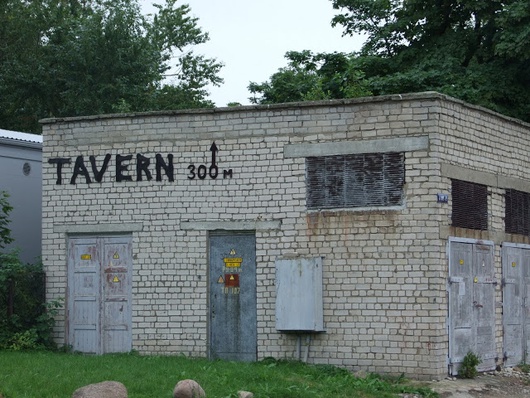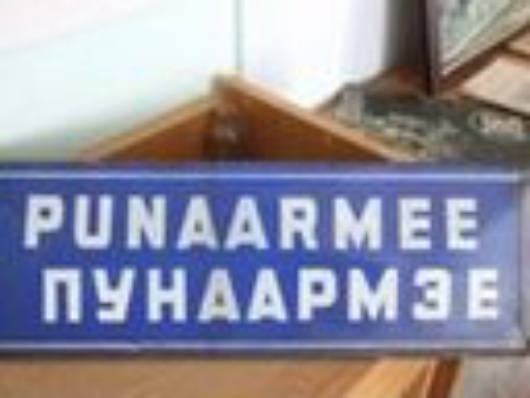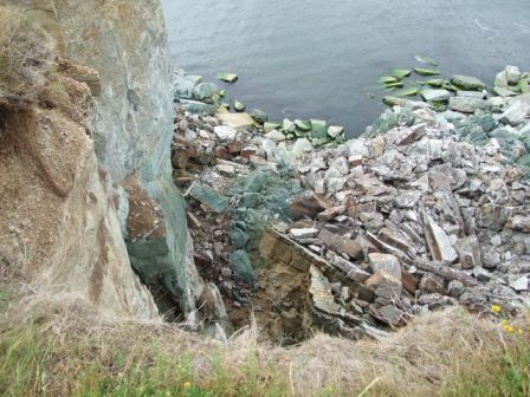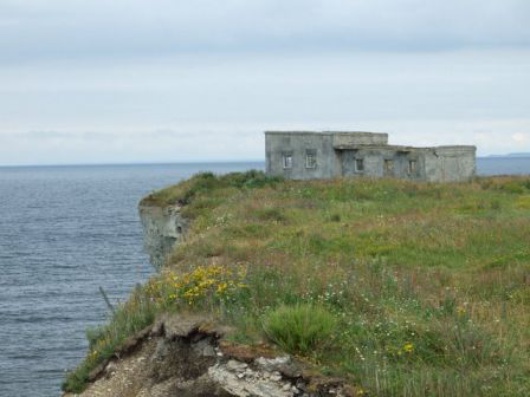Discovering Estonia: Paldiski, Russians and the Coastline
Published on

 “Do you feel accepted in here? Isn’t it hard to live in a
place where you are considered foreigner in your own country?” I ask realizing that,
most of the time, this is The question I pose to Russian people. And it feels
strange to ask it to an Estonian now.
“Yes, sometimes it is hard. Some people do not like me
because I am not Russian, is true. Once one old lady who lives close to my
apartment started to yell at me arguing that I should not expose my clothes to
the public view when I put them to dry. Because no one want to see any dirty
Estonian one.”, she tells me without the sufferance I would expect from such
words.
“And what about last April, then?” I try to ask. “How was to
live it here…what did you feel those days?”
“Well,” she says while she points her eyes on something a
way too far to be seen. “I discovered that on the news and I was shocked as
almost everyone else, but it did not pass too much time until everything
started to happen also outside our windows.”
“Nothing serious happened here in Paldiski: just few people
damaging some cars and nothing else. But when I have seen those military cars
stationing here –and she points her fingers to a place next to the main road,
close to a pizzeria. Ndr- I felt
it. I felt I was almost 20 years back. I felt we got trapped again. I felt we
finally woke up from our dream of independence.”
Few minutes later we are back in the Tavern smiling as
nothing had ever been said and we are ready to start the second part of our
Paldiski visit: the coastline.
Being obliged to split our group in two parts because of the
number of places available in the car, I go with Jaana and the director of the
museum to one of the most amazing places I happened to visit in Estonia.
After a 5 minutes minutes drive and a nice wall paint saying
“Welcome to Hell”, we get close to Paldiski military base, a place where we
will probably not be able to see in few year anymore.
“Do you feel accepted in here? Isn’t it hard to live in a
place where you are considered foreigner in your own country?” I ask realizing that,
most of the time, this is The question I pose to Russian people. And it feels
strange to ask it to an Estonian now.
“Yes, sometimes it is hard. Some people do not like me
because I am not Russian, is true. Once one old lady who lives close to my
apartment started to yell at me arguing that I should not expose my clothes to
the public view when I put them to dry. Because no one want to see any dirty
Estonian one.”, she tells me without the sufferance I would expect from such
words.
“And what about last April, then?” I try to ask. “How was to
live it here…what did you feel those days?”
“Well,” she says while she points her eyes on something a
way too far to be seen. “I discovered that on the news and I was shocked as
almost everyone else, but it did not pass too much time until everything
started to happen also outside our windows.”
“Nothing serious happened here in Paldiski: just few people
damaging some cars and nothing else. But when I have seen those military cars
stationing here –and she points her fingers to a place next to the main road,
close to a pizzeria. Ndr- I felt
it. I felt I was almost 20 years back. I felt we got trapped again. I felt we
finally woke up from our dream of independence.”
Few minutes later we are back in the Tavern smiling as
nothing had ever been said and we are ready to start the second part of our
Paldiski visit: the coastline.
Being obliged to split our group in two parts because of the
number of places available in the car, I go with Jaana and the director of the
museum to one of the most amazing places I happened to visit in Estonia.
After a 5 minutes minutes drive and a nice wall paint saying
“Welcome to Hell”, we get close to Paldiski military base, a place where we
will probably not be able to see in few year anymore. The wind keeps blowing on an incredible game the nature is
playing on there. The three of us are standing in front of the sea, in front of
some 50meters fall, without any protection between us, the waves and the rocks.
“Why?” I ask. “Why don’t they put something here to protect
people from jumping?”
“Because it would be useless” she answers.
Every couple of months a new part of the land falls down on
the sea without any chance of avoiding it. “The lower part of this land is much
softer than the upper one so, when the water starts to attack, there is no
chance. It starts falling down. As here, look!”. She points her finger few
steps behind us where the sole is full of small creeps, sign of an imminent
fall.
“Tap your feet, listen to the sound. In few months even this
part will disappear” and she is right. The noise is strange, almost empty.
Somehow scary too.
Behind us, some hundreds meters from the coastline, some
brand new windmills stands happy about a wind comparable to that damned one I
found once while going to “el Guincho” a beach on the open Ocean next to
Cascais.
The wind keeps blowing on an incredible game the nature is
playing on there. The three of us are standing in front of the sea, in front of
some 50meters fall, without any protection between us, the waves and the rocks.
“Why?” I ask. “Why don’t they put something here to protect
people from jumping?”
“Because it would be useless” she answers.
Every couple of months a new part of the land falls down on
the sea without any chance of avoiding it. “The lower part of this land is much
softer than the upper one so, when the water starts to attack, there is no
chance. It starts falling down. As here, look!”. She points her finger few
steps behind us where the sole is full of small creeps, sign of an imminent
fall.
“Tap your feet, listen to the sound. In few months even this
part will disappear” and she is right. The noise is strange, almost empty.
Somehow scary too.
Behind us, some hundreds meters from the coastline, some
brand new windmills stands happy about a wind comparable to that damned one I
found once while going to “el Guincho” a beach on the open Ocean next to
Cascais. “But, I remember that one of the main complaints about
windmills beside the strange sound they make, is that they produce a lot of
vibrations which, people thinks, might be not too good for the ground. So…how come you have windmills here?! Doesn’t
it accelerate the process making more land fall into the sea?”
“Maybe. It might be true.” She tells me while walking around
and showing me a building which, in some months, will be simply a souvenir as
everything which has been build in front of it. “It will not last more than a
year.”
The wind keeps blowing too much and the others are
waiting in town so we realize that we have to come back and leave this
incredible scenario for getting back to today’s and stop looking at that
strange rocket standing outside the army base.Estonia
“But, I remember that one of the main complaints about
windmills beside the strange sound they make, is that they produce a lot of
vibrations which, people thinks, might be not too good for the ground. So…how come you have windmills here?! Doesn’t
it accelerate the process making more land fall into the sea?”
“Maybe. It might be true.” She tells me while walking around
and showing me a building which, in some months, will be simply a souvenir as
everything which has been build in front of it. “It will not last more than a
year.”
The wind keeps blowing too much and the others are
waiting in town so we realize that we have to come back and leave this
incredible scenario for getting back to today’s and stop looking at that
strange rocket standing outside the army base.Estonia



